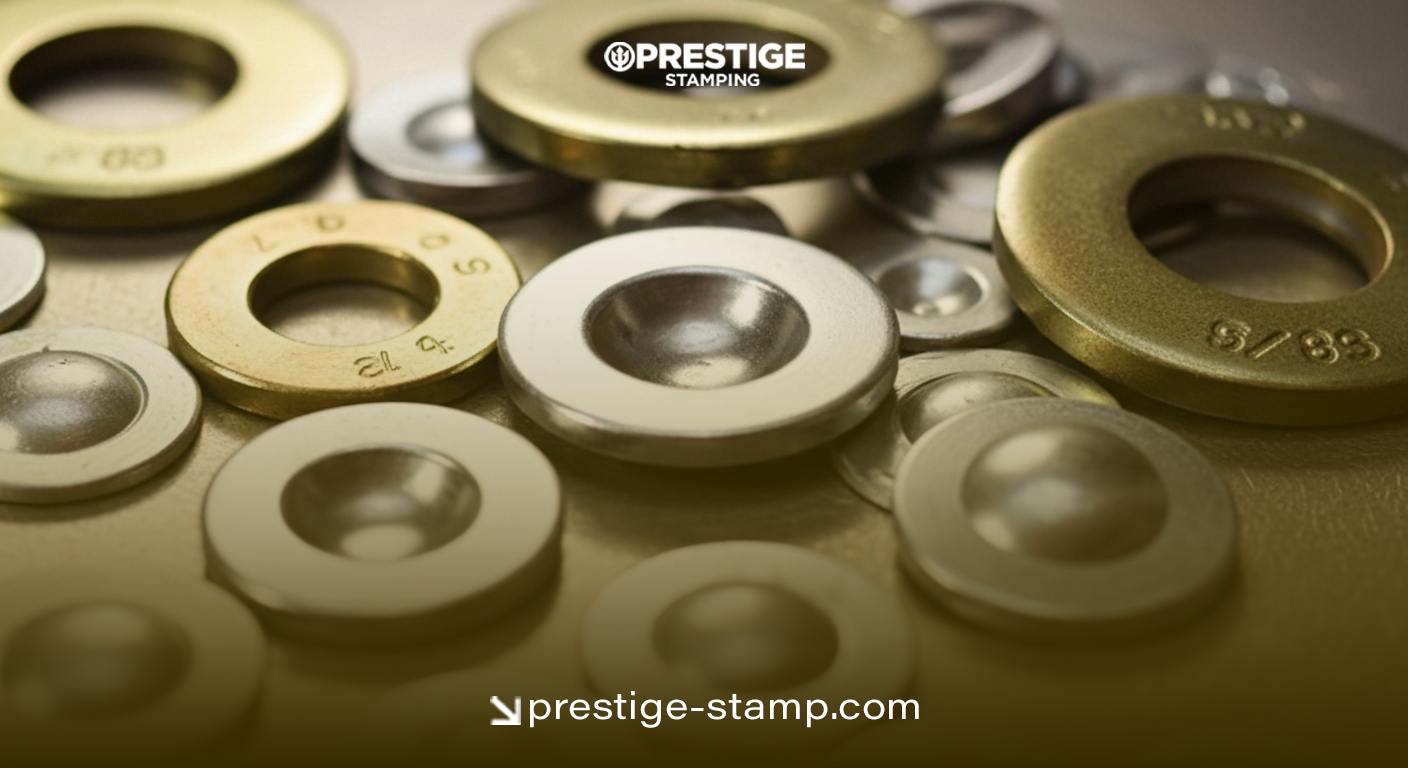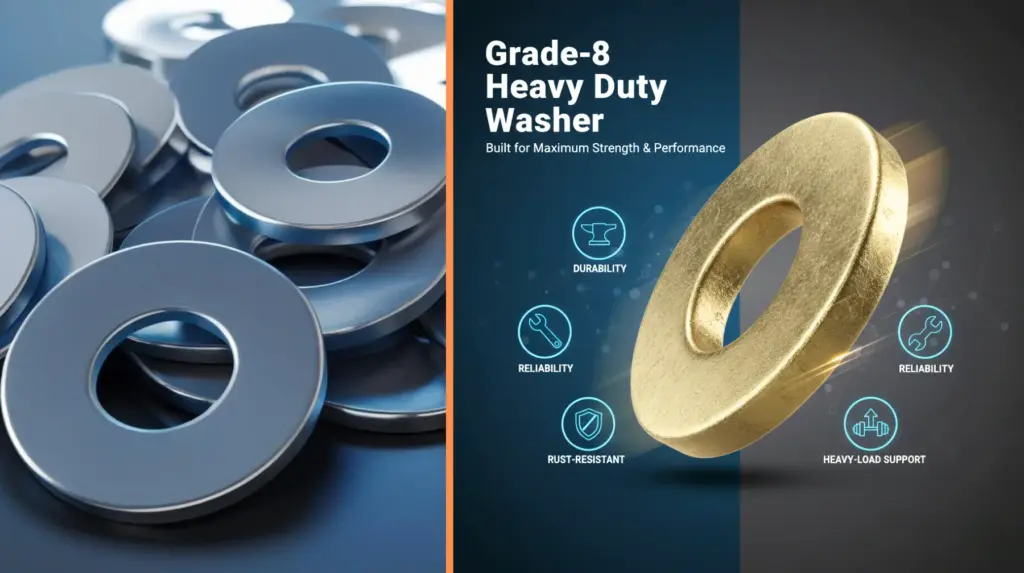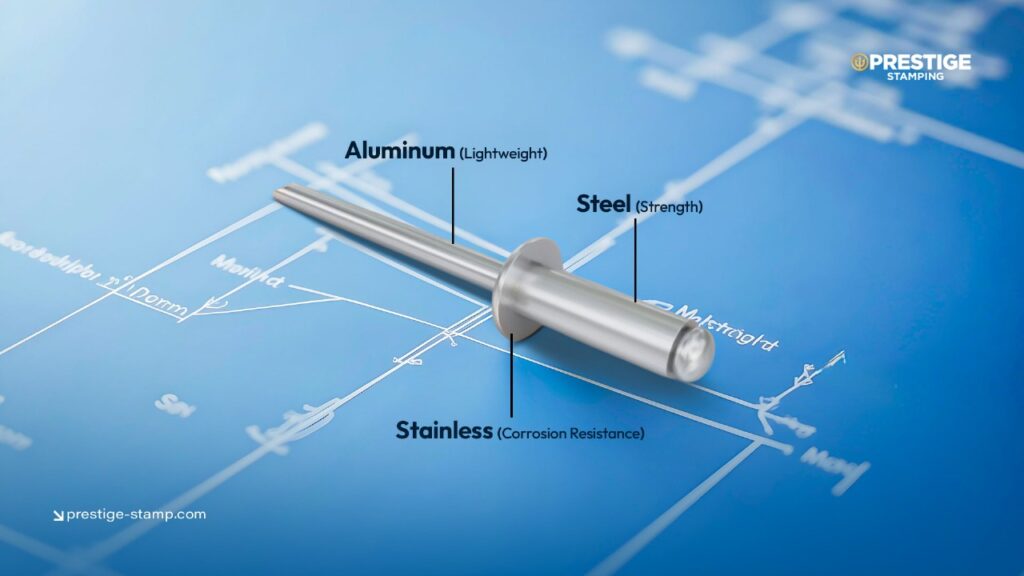Washers are small components that are used in mechanical engineering projects. But they play an essential role in ensuring the safety and durability of assemblies. Engineers and procurement professionals need to understand the different types of metal washers. This guide gives a clear and complete overview of the most common types.
Why Washers Matter in Industrial Applications
Though small and often overlooked, washers play critical roles such as
- Load distribution to prevent damage to surfaces.
- Vibration damping to enhance assembly stability.
- Sealing is used to prevent leaks in critical joints.
- Locking to prevent loosening due to vibrations or thermal cycling.
Different Types of Metal Washers
Washers can be broadly categorized by their function, shape, and material. Below, we break down the most common and specialized types.
Plain Washers
Plain washers are flat discs usually made of carbon steel, stainless steel, or brass. They come in various sizes and thicknesses to evenly distribute the load of a bolt or nut. Their primary function is to protect surfaces and prevent fastener damage. They are ideal for general-purpose industrial assemblies.
Spring Washers
Spring washers are usually made from hardened spring steel. Some of its common types include Belleville (conical) and split lock washers.
They provide tension and resist loosening caused by vibration or thermal changes. This type of washer is used in automotive, aerospace, and dynamic machinery.
Lock Washers
Lock washers are usually made from strong steel or stainless steel. They stop fasteners from loosening by locking them in place. You’ll see them in heavy machines, structural joints, and safety-critical equipment.
Sealing Washers
Sealing washers are made from rubber, fiber, neoprene, or metal with inserts. They block leaks of liquids or gases by creating tight seals. They are common in plumbing, hydraulic systems, and fuel connections.
Shoulder Washers
Shoulder washers are made from nylon or other polymers. They stop electrical contact between parts. These are often used in electronics and circuit boards.
Countersunk Washers
Countersunk washers are usually made of steel or stainless steel. They have beveled edges that fit flush under screw heads. They spread the load evenly and improve grip. They are used in aerospace and precision machines where smooth fittings are required.
Specialized Washers
Other than the types mentioned above. There are some special washers used for a specific purpose. Some common examples include wave washers, tab washers, and C-washers. Different materials can be used to build them based on the job they will perform. This type of washer can be used in cars, electronics, and complex machines.
How to Choose the Right Washer
Several key factors should be considered for choosing the right washer:
Material Compatibility
It is important to consider the materials of a washer before selecting it. Here is an overview of how materials can impact the strength and durability of a washer:
Stainless Steel
Stainless steel washers are very useful for corrosion resistance. This makes it ideal for wet, marine, and chemical environments.
Carbon Steel
Carbon steel washers can handle heavy loads. They need protective coatings, such as zinc plating, to prevent rust.
Brass and Copper
These materials provide good electrical and thermal conductivity along with corrosion resistance. Brass and copper washers are good for electrical connections. They also work well in heat exchangers and plumbing systems.
Aluminum
Aluminum washers are lightweight and have good thermal conductivity. They are used in aerospace and automotive applications.
Plastic (Nylon, Polypropylene, PTFE)
Plastic washers excel in chemical resistance, electrical insulation, and lightweight applications. They are ideal for light mechanical loads. They work well in electronic assemblies. They are also useful in corrosive environments where metals may rust.
Rubber and Silicone
Rubber and silicone washers are flexible and compressible. They are used for sealing, waterproofing, and reducing vibration. They perform well in plumbing, automotive, and hydraulic systems exposed to temperature fluctuations.
Load and Size Requirements
Match the washer to the bolt size and load. Thicker washers spread the load better but must fit the design space.
Vibration and Movement
For vibration or dynamic loads, use lock, spring, or toothed washers. These prevent fasteners from loosening.
Surface Protection and Sealing
If the surface is delicate or sealing is needed, choose rubber, plastic, or fiber washers. These protect surfaces and stop leaks.
Assembly Type and Space Constraints
Think about whether the joint is permanent or temporary. Limited space may require thinner or special washers, like countersunk types.
Standards and Specifications
Always check that washers meet standards like ISO, DIN, or ANSI. This ensures size, material, and performance are reliable.
Conclusion
There are many types of washers, each designed for specific applications. Choosing the right washer is critical in engineering projects. The wrong choice can cause downtime and heavy losses.
For high-quality, precision-engineered washers made in the USA, trust Prestige Stamping. With over 50 years of expertise and advanced manufacturing, we deliver both standard and custom washers built to your exact specifications. Need high-quality washers for your next engineering project? Contact Prestige Stamping today.



